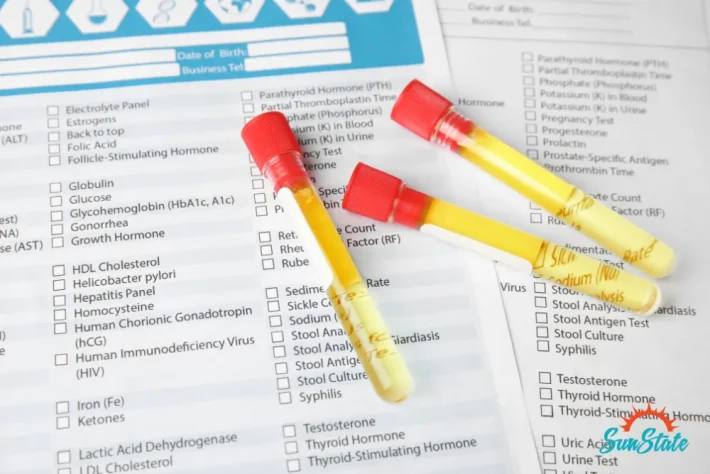How Much Water to Drink Before a Drug Test: Complete Guide
Wondering how much water to drink before a drug test? Most experts recommend consuming 16 to 24 ounces of water about one to two hours before your screening. This level of hydration helps ensure your urine sample is neither too concentrated nor too diluted.
Knowing how much water to drink before a drug test is crucial—not just for accuracy but also to avoid sample rejection. This comprehensive guide breaks down hydration science, testing methods, myths, and best practices to help you feel informed and confident on test day.
Why Staying Hydrated Matters Before a Drug Test
The Role of Hydration in Drug Testing: What You Need to Know
Water is essential to many bodily functions, and its importance becomes even more critical when preparing for a drug screening. The human body is approximately 60% water, and staying properly hydrated directly influences how efficiently your body eliminates drug metabolites through urine.
1. Hydration and Urine Concentration
When you are adequately hydrated, your kidneys are able to filter and excrete waste efficiently, resulting in urine that falls within a normal concentration range. This balance ensures the levels of solutes like creatinine and drug metabolites remain within expected parameters, which reduces the likelihood of your sample being flagged for abnormalities.
In contrast, being dehydrated causes your urine to become darker and more concentrated. This not only increases the detectability of any drug residues present but can also raise suspicions due to high specific gravity levels in the sample.
2. The Risk of Overhydration
While hydration is important, overhydrating—drinking excessive amounts of water just before a test—can backfire. Extremely diluted urine may result in low creatinine levels and low specific gravity, which can cause the sample to be labeled as:
-
“Negative dilute” – meaning no drugs were found, but the sample is too diluted to be trusted.
-
“Positive dilute” – drug metabolites are found, but the sample is still suspicious due to dilution.
-
“Invalid” or “Rejected” – in some cases, the lab may require a retest due to improper sample integrity.
In regulated environments like DOT (Department of Transportation) testing, a negative dilute may lead to mandatory retesting under direct supervision.
3. Biomarkers Used to Detect Dilution
Labs don’t just test for drug metabolites. They also analyze urine creatinine levels and specific gravity to confirm the sample’s integrity. These biomarkers help identify when a sample is too diluted or too concentrated. Suspicious levels can indicate tampering, overhydration, or an attempt to mask drug use.
4. Supporting Liver and Kidney Function
Proper hydration also supports the liver and kidneys—two organs vital to detoxification:
-
The liver metabolizes substances, transforming drugs into water-soluble compounds.
-
The kidneys filter these metabolites from the blood and excrete them in urine.
Without enough water, kidney filtration slows down, potentially reducing the rate at which metabolites are cleared from the body.
5. Best Practices Before a Drug Test
To ensure accurate and valid results, follow these hydration guidelines:
-
Do drink water regularly in the 24–48 hours before the test.
-
Don’t overhydrate (limit intake to about 16–24 oz in the hours leading up to the test).
-
Avoid caffeine or strong diuretics just before your screening.
-
Do not attempt to tamper with or flush your system aggressively; labs are trained to detect this.
How Drug Testing Works and Why It Affects Hydration Strategy
Before deciding how much water to drink before a drug test, understand the type of test you’re taking. Each test has different detection timeframes and hydration sensitivities:
- Urine Drug Test: The most common method. Detects drugs consumed within days or weeks.
- Blood Drug Test: Identifies substances used in the last few hours or days.
- Saliva Drug Test: Non-invasive and effective for recent use (1–2 days).
This information can help you tailor your water intake appropriately for accurate results.
Factors That Influence How Much Water You Should Drink
Optimal hydration isn’t a one-size-fits-all equation. Several personal and environmental factors determine how much water your body actually needs before undergoing a urine drug screening. Understanding these variables can help you maintain appropriate hydration—supporting clean, valid test results without risking dilution or dehydration.
1. Body Size & Weight
Larger individuals generally require more water to maintain balanced hydration. Body mass affects total blood volume and water distribution, meaning a 200-lb person typically needs more fluid intake than a 120-lb person to stay equally hydrated.
2. Metabolism
Those with faster metabolisms tend to process and eliminate substances more quickly, including drug metabolites. As a result, adequate hydration becomes even more important to support the increased rate of excretion through the kidneys.
3. Drug Use History
The amount and frequency of prior substance use play a major role in how long metabolites remain detectable:
-
Heavier or more recent use leads to higher metabolite concentrations in urine.
-
More hydration won’t instantly eliminate metabolites—it may slightly aid elimination, but only time and metabolic processing reduce levels meaningfully.
Important: Overhydration will not speed up detox and may cause your sample to be flagged.
4. Time Since Last Use
If you’ve abstained from drug use for several days or weeks, your metabolite levels will naturally be lower. In these cases, normal hydration is typically sufficient—there’s less risk of high metabolite concentrations in urine.
5. Health Conditions & Medications
Underlying health conditions (such as kidney or liver disease) and certain medications (e.g., diuretics, blood pressure meds, or antidepressants) can affect how your body retains or expels water.
Always consider your medical background when adjusting water intake before a test.
6. Environmental Conditions
External factors like hot weather, high altitude, or intense physical activity cause your body to lose more fluids through sweat and respiration. In such cases, your fluid needs increase, and you may need to hydrate more than usual to maintain normal urine output and concentration.
How Much Water to Drink Before a Drug Test
Below are general water intake guidelines by test type to help you stay hydrated without overdoing it:
| Test Type | Suggested Water Intake | Timing |
|---|---|---|
| Urine Drug Test | 12–16 oz (350–475 mL) | 2–4 hours before |
| Blood Drug Test | 8–12 oz (240–350 mL) | 1–2 hours before |
| Saliva Drug Test | 8–12 oz (240–350 mL) | 1–2 hours before |
Pro Tip: Spread your water intake gradually rather than drinking it all at once. This helps prevent overhydration and ensures consistency in urine concentration.
Using Urine Color to Evaluate Hydration
Checking your urine color is one of the simplest ways to know if you’re drinking the right amount of water before a drug test:
- Pale Yellow: Ideal hydration level.
- Dark Yellow or Amber: Dehydrated—drink more water.
- Clear or Colorless: Overhydrated—cut back a bit.
For test day, aim for a pale yellow hue for the most balanced results.
Dangers of Drinking Too Much Water Before a Drug Test
More water isn’t always better. Overhydrating before a drug test can cause complications such as:
- Hyponatremia: A serious condition caused by low sodium levels due to excessive water intake.
- Invalid Sample: Diluted urine may be flagged, resulting in a retest or suspicion.
- Tampering Concerns: Extremely low concentration samples can trigger additional scrutiny.

Hydration Best Practices: How to Hydrate Safely
Follow these hydration strategies to avoid mistakes and maintain balance before your test:
-Start hydrating 2–3 days before the test.
-Drink water evenly throughout the day.
-Include electrolyte-rich beverages if needed.
-Monitor your urine color.
-Avoid binge drinking large amounts right before the test.
-Consider creatine supplements if advised by a healthcare provider.
Additional Tips Beyond Just Hydration
While hydration is important, it’s not the only factor in drug test preparation:
- Abstain from Drugs: This is the only guaranteed way to pass a test.
- Be Cautious with Detox Products: Most lack scientific backing and may not work.
- Don’t Tamper: Adulterated or manipulated samples often result in automatic failure.
Myths and Facts About Drinking Water Before a Drug Test
Let’s bust some common myths about water and drug test preparation:
Myth: Drinking gallons of water ensures a clean test.
Fact: Overhydration can invalidate your sample.
Myth: Additives or masking agents will hide drug use.
Fact: Labs test for adulterants and can detect manipulation.
Myth: Detox drinks eliminate all traces of drugs.
Fact: Most detox products are unproven and unreliable.
Myth: Drinking water right before the test is enough.
Fact: Gradual hydration over several days is more effective.
FAQs About How Much Water to Drink Before a Drug Test
How much water is too much before a drug test?
Drinking more than 24–32 oz (700–950 mL) in under two hours before testing may dilute your urine excessively.
Can sports drinks replace water before a test?
Electrolyte drinks can help support balance, but shouldn’t be your sole hydration source due to high sugar content.
Do tea or coffee count toward hydration?
They contribute modestly, but due to their diuretic properties, they shouldn’t be your main fluid intake before a test.
Final Thoughts: How Much Water to Drink Before a Drug Test
Understanding how much water to drink before a drug test is crucial to optimizing your chances of passing. Smart hydration helps balance your body, supports detoxification, and ensures your urine sample falls within acceptable parameters.
Combine proper hydration with early abstinence and honest preparation for the most reliable outcome.
Conclusion: Mastering How Much Water to Drink Before a Drug Test
To conclude: drinking the right amount of water before a drug test can support accurate, reliable results. Avoid extremes, stay aware of your urine color, and hydrate smartly over time—not just last minute.
Always consult a healthcare provider for personal advice. With preparation and the right hydration strategy, you can approach your drug test with confidence.
Legal Disclaimer
*The content provided on this blog is for informational purposes only and should not be considered medical advice.
*The statements made about CBD products have not been evaluated by the U.S. Food and Drug Administration (FDA).
*These products are not intended to diagnose, treat, cure, or prevent any disease or medical condition.
*Always use products as directed on their labels. If you are pregnant, nursing, or have a medical condition, consult with a licensed healthcare professional before using any hemp-derived products.
*Products mentioned on this site contain no more than 0.3% Δ9THC in compliance with federal law.
*These products are not for use or sale to individuals under the age of 18 or 21, depending on the legal age in your state or territory.
*The sale and use of these products may be restricted in certain jurisdictions, and it is your responsibility to comply with all local laws and regulations.
*Always consult with a healthcare provider before introducing new supplements or wellness products into your routine.
*By accessing this site, you agree to abide by the Privacy Policy and Terms & Conditions provided
References & Resources
- U.S. Drug Testing Centers: Negative Dilute Drug Test Result
- ScienceDirect: Understanding Urine Specific Gravity and Creatinine
- SureHire: The Science Behind Positive Dilute Results
- UNC School of Government: Specimen Validity and Dilution
- PMC – National Library of Medicine: Urine Sample Validity and Testing Practices
- Cherokee County Drug Lab: Dilute Urine Sample Protocols



